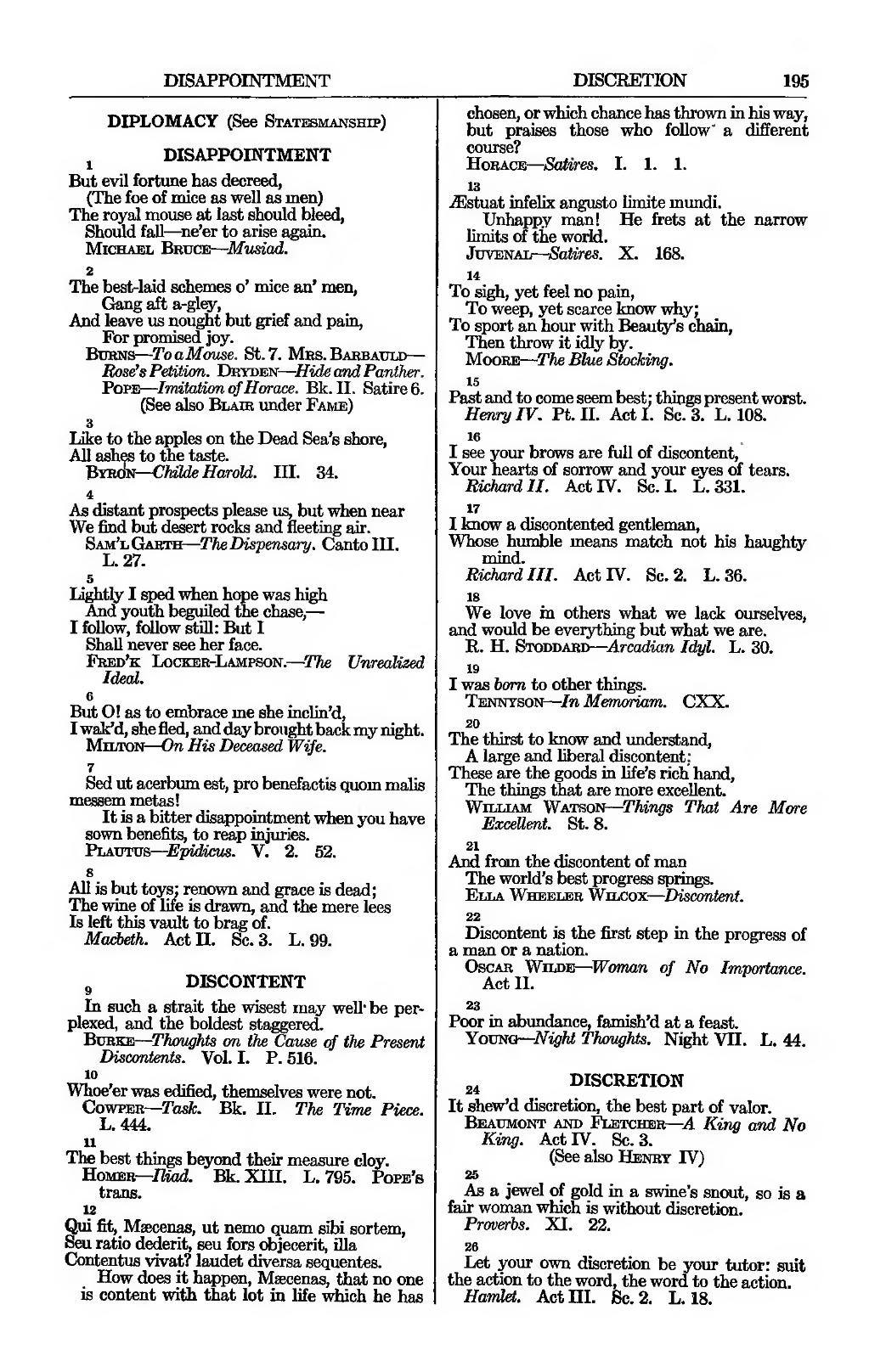DIPLOMACY (See Statesmanship)
DISAPPOINTMENT
But evil fortune has decreed,
(The foe of mice as well as men)
The royal mouse at last should bleed,
Should fall—ne'er to arise again.
The best-laid schemes o' mice an' men,
Gang aft a-gley,
And leave us nought but grief and pain,
For promised joy.
Burns—To a Mouse. St. 7. Mrs.Barbauld—
Rose's Petition. Dryden—Hide and Panther.
| author = Pope
| work = Imitation of Horace.
| place = Bk. II. Satire 6.
| seealso = (See also Blair under Fame)
| topic =
| page =
}}
{{Hoyt quote
| num =
| text = <poem>Like to the apples on the Dead Sea's shore,
All ashes to the taste.
As distant prospects please us, but when near
We find but desert rocks and fleeting air.
Sam'l Garth—The Dispensary. Canto III.
L. 27.
Lightly I sped when hope was high
And youth beguiled the chase,—
I follow, follow still: But I
Shall never see her face.
Fred'k Locker-Lampson.—The Unrealized
Ideal.
But O! as to embrace me she inclin'd,
I wak'd, she fled, and day brought back my night.
| author = Milton
| work = On His Deceased Wife.
Sed ut acerbum est, pro benefactis quom malis
messem met as!
It is a bitter disappointment when you have
sown benefits, to reap injuries.
Plautus—Epidicus. V. 2. 52.
All is but toys; renown and grace is dead;
The wine of life is drawn, and the mere lees
Is left this vault to brag of.
Macbeth. Act II. Sc. 3. L. 99.
DISCONTENT
In such a strait the wisest may well' be perplexed, and the boldest staggered.
Burke—Thoughts on the Cause of the Present
Discontents. Vol.1. P. 516.
Whoe'er was edified, themselves were not.
The best things beyond their measure cloy.
Qui fit, Maecenas, ut nemo quam sibi sortem,
Seu ratio dederit, seu fors objecerit, ilia
Contentus vivat? laudet diversa sequentes.
How does it happen, Maecenas, that no one
is content with that lot in life which he has
chosen, or which chance has thrown in his way,
but praises those who follow' a different
course?
Horace—Satires. I. 1. 1.
Æstuat infelix angusto limite mundi.
Unhappy man! He frets at the narrow limits of the world.
Juvenal—Satires. X. 168.
To sigh, yet feel no pain,
To weep, yet scarce know why;
To sport an hour with Beauty's chain,
Then throw it idly by.
Moore—The Blue Stocking.
| author =
| work =
| place =
| note =
| topic =
| page =
}}
{{Hoyt quote
| num = 15
| text = Past and to come seem best; things present worst.
Henry IV. Pt. II. Act I. Sc. 3. L. 108.
la
I see your brows are full of discontent,
Your hearts of sorrow and your eyes of tears.
Richard II. Act IV. Sc. I. L. 331.
I know a discontented gentleman,
Whose humble means match not his haughty
mind.
Richard III. Act IV. Sc. 2. L. 36.
| author =
| work =
| place =
| note =
| topic =
| page =
}}
{{Hoyt quote
| num = 15
| text = We love in others what we lack ourselves,
and would be everything but what we are.
R. H. Stoddard—Arcadian Idyl. L. 30.
I was born to other things.
| author = Tennyson
| work = In Memoriam. CXX.
The thirst to know and understand,
A large and liberal discontent:
These are the goods in life's rich hand,
The things that are more excellent.
William Watson—Things That Are More
Excellent. St. 8.
And from the discontent of man
The world's best progress springs.
Ella Wheeler Wilcox—Discontent.
Discontent is the first step in the progress of
a man or a nation.
| author = Oscar Wilde
| work = Woman of No Importance.
Act II.
Poor in abundance, famish'd at a feast.
Young—Night Thoughts. Night VII. L. 44.
DISCRETION
It shew'd discretion, the best part of valor.
| author = Beaumont and Fletcher
| work = A King and No
King. Act III. Sc. 3.
| seealso = (See also Henry IV)
| topic =
| page =
}}
{{Hoyt quote
| num =
| text = <poem>As a jewel of gold in a swine's snout, so is a
fair woman which is without discretion.
Proverbs. XI. 22.
Let your own discretion be your tutor: suit
the action to the word, the word to the action.
Hamlet. Act III. Sc. 2. L. 18.

